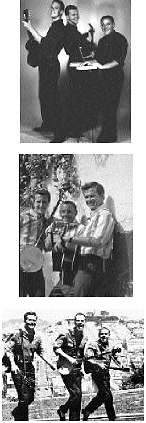Evil rules the pop charts. Every time you look at MTV, you’ll see yet another emerging musician who is being painted as the greatest threat to America’s moral fiber since, well, whoever’s in the White House. I’m talking about the type of artist that even liberal parents—ones who encourage their offspring to address them by their first name instead of as Mom and Dad—take exception to, and that moral watchdogs insist are putting young innocents on the fast track to eternal damnation.
Right now, that villain is Eminem. Over the years, Glenn Danzig, 2 Live Crew, and Johnny Rotten have held the title, too. Even Little Richard, who these days is about as threatening as Lambchop, was once considered an agent of the devil, a notion as preposterous as backwards messages hidden on Black Oak Arkansas LPs.
But where did this nefarious chain begin? Sinatra? Elvis? Honestly, I believe the answer is different for every music lover. We can all point to a record or a performer who was our personal gateway to the dark side. For some, it’s “Great Balls of Fire”; others might finger White Zombie as the culprit. I can only speak for myself when I name the act that robbed me of salvation:
The Kingston Trio.
For those who don’t recognize the name, the Kingston Trio is not a Jamaican reggae ensemble. Far from it. Formed in 1957, this San Francisco threesome sparked the folk-music craze of the ’60s. Bob Shane, Nick Reynolds, and Dave Guard (later replaced by John Stewart) wore striped shirts, white pants, and goofy grins, and sang three-part harmonies accompanied by guitar and banjo. Five of their first six albums hit No. 1, and my parents owned all of them when I was a child. And, for want of any other pop music in the record cabinet, I listened to them religiously.
At the time, extensive exposure to the Trio’s platters—by turns breezy and funny, then poignant and sad—seemed to have no adverse effect on me. Eventually I entered public school and discovered FM radio and rock music and the influence of the Kingston Trio in my life diminished significantly. Or so it seemed.
The other day, my friend Jason approached me about joining his “wholesome folk” act. The time is ripe, he insisted, for a revival of freshly scrubbed young men lifting voices raised in harmony. Jason has a shedful of mandolins, banjos, and ukuleles, and I know all the words to “Lemon Tree” by heart. Just for good measure, we roped in a third friend who can actually play the guitar. Having rejected the name the Ballard Balladeers as too provincial, we’ve decided to call ourselves the Two Lads, a name coined by our pal John Wesley Harding—who certainly knows something about nomenclature.
Offers to play started rolling in immediately. I was especially inspired by the prospect of getting on the bill for a tribute night where local musicians perform their favorite numbers by the Cure. Few performance concepts could be more perverse than a trio of “Up With People”-cast rejects cooing “Kyoto Song” from 1985’s The Head on the Door: “A nightmare of you/Of death in the pool/Wakes me up at quarter to three/I’m lying on the floor of the night before/With a stranger lying next to me.”
But when I pulled out my secondhand Kingston Trio LPs to study their arrangements, I made a horrifying discovery: The lyrical content is just as rife with guns, booze, and illegal activity as any album by N.W.A. or Nick Cave. Their breakout single, 1958’s “Tom Dooley,” tells the story of a guy who stabs his sweetheart to death. Drinking and gambling land the boys behind bars on “The Tijuana Jail.” On my personal favorite, “Scotch and Soda,” they croon about dry martinis and getting “higher than a kite can fly.”
Suddenly a memory came rushing back up at me. I’m 8 years old and I’ve been listening to the 1959 album From the “Hungry i” all afternoon. We’re about to go somewhere in the car and I’m dancing around the driveway, singing the Trio’s calypsonian romp “Zombie Jamboree” loud enough to rouse the neighbors. The third time I hit the chorus—”Back to back/Belly to belly/We don’t give a damn/Cuz it doesn’t matter really . . .”—my mother brings her hand down on my shoulder, fixes me with her serious brown eyes, and says, “Good Christians don’t use that word.”
Twenty-five years later, I’m a heathen, a homosexual, and I still use that word a lot.
Perhaps the Kingston Trio doesn’t seem capable of corrupting an innocent. None of their members were ever convicted of murder or assault, or caught getting blown by a transvestite hooker in the family station wagon, or wound up in the Betty Ford Clinic. But then again, neither has Marilyn Manson.






